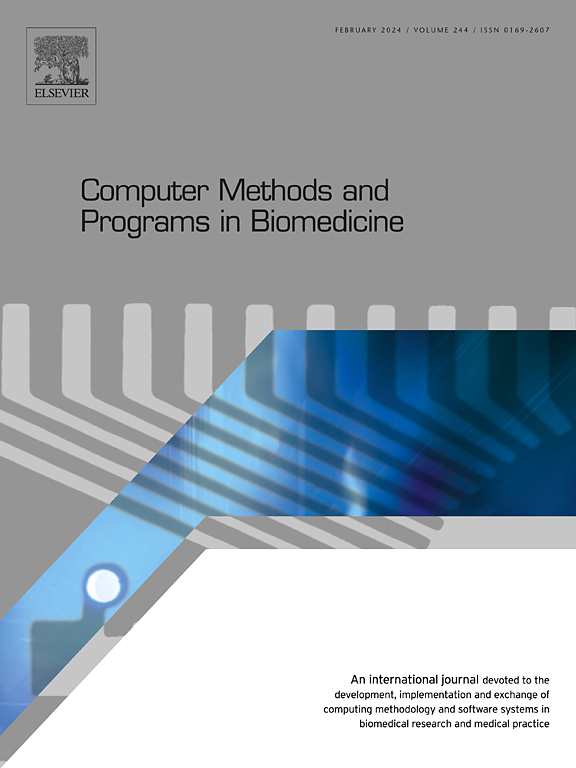MCNEL: A multi-scale convolutional network and ensemble learning for Alzheimer’s disease diagnosis
IF 4.9
2区 医学
Q1 COMPUTER SCIENCE, INTERDISCIPLINARY APPLICATIONS
引用次数: 0
Abstract
Background and Objective:
Alzheimer’s disease (AD) significantly threatens community well-being and healthcare resource allocation due to its high incidence and mortality. Therefore, early detection and intervention are crucial for reducing AD-related fatalities. However, the existing deep learning-based approaches often struggle to capture complex structural features of magnetic resonance imaging (MRI) data effectively. Common techniques for multi-scale feature fusion, such as direct summation and concatenation methods, often introduce redundant noise that can negatively affect model performance. These challenges highlight the need for developing more advanced methods to improve feature extraction and fusion, aiming to enhance diagnostic accuracy.
Methods:
This study proposes a multi-scale convolutional network and ensemble learning (MCNEL) framework for early and accurate AD diagnosis. The framework adopts enhanced versions of the EfficientNet-B0 and MobileNetV2 models, which are subsequently integrated with the DenseNet121 model to create a hybrid feature extraction tool capable of extracting features from multi-view slices. Additionally, a SimAM-based feature fusion method is developed to synthesize key feature information derived from multi-scale images. To ensure classification accuracy in distinguishing AD from multiple stages of cognitive impairment, this study designs an ensemble learning classifier model using multiple classifiers and a self-adaptive weight adjustment strategy.
Results:
Extensive experiments on the Alzheimer’s Disease Neuroimaging Initiative (ADNI) dataset validate the effectiveness of our solution, which achieves average accuracies of 96.67% for ADNI-1 and 96.20% for ADNI-2, respectively. The results indicate that the MCNEL outperforms recent comparable algorithms in terms of various evaluation metrics, demonstrating superior performance and robustness in AD diagnosis.
Conclusions:
This study markedly enhances the diagnostic capabilities for AD, allowing patients to receive timely treatments that can slow down disease progression and improve their quality of life.
MCNEL:用于阿尔茨海默病诊断的多尺度卷积网络和集成学习
背景与目的:阿尔茨海默病(AD)因其高发病率和死亡率而严重威胁着社区福祉和医疗资源配置。因此,早期发现和干预对于减少ad相关死亡至关重要。然而,现有的基于深度学习的方法往往难以有效地捕获磁共振成像(MRI)数据的复杂结构特征。常用的多尺度特征融合技术,如直接求和和拼接方法,往往会引入冗余噪声,从而对模型性能产生负面影响。这些挑战突出了开发更先进的方法来改进特征提取和融合的需要,旨在提高诊断的准确性。方法:本研究提出了一个多尺度卷积网络和集成学习(MCNEL)框架,用于AD的早期和准确诊断。该框架采用了增强版的EfficientNet-B0和MobileNetV2模型,随后与DenseNet121模型集成,创建了一个混合特征提取工具,能够从多视图片中提取特征。此外,提出了一种基于simam的多尺度图像关键特征信息融合方法。为了保证区分AD与多阶段认知障碍的分类准确性,本研究设计了一个使用多分类器和自适应权值调整策略的集成学习分类器模型。结果:在阿尔茨海默病神经成像倡议(ADNI)数据集上进行的大量实验验证了我们的解决方案的有效性,ADNI-1和ADNI-2的平均准确率分别达到96.67%和96.20%。结果表明,MCNEL在各种评估指标方面优于最近的可比算法,在AD诊断中表现出卓越的性能和鲁棒性。结论:本研究显著提高了AD的诊断能力,使患者能够及时接受治疗,减缓疾病进展,提高生活质量。
本文章由计算机程序翻译,如有差异,请以英文原文为准。
求助全文
约1分钟内获得全文
求助全文
来源期刊

Computer methods and programs in biomedicine
工程技术-工程:生物医学
CiteScore
12.30
自引率
6.60%
发文量
601
审稿时长
135 days
期刊介绍:
To encourage the development of formal computing methods, and their application in biomedical research and medical practice, by illustration of fundamental principles in biomedical informatics research; to stimulate basic research into application software design; to report the state of research of biomedical information processing projects; to report new computer methodologies applied in biomedical areas; the eventual distribution of demonstrable software to avoid duplication of effort; to provide a forum for discussion and improvement of existing software; to optimize contact between national organizations and regional user groups by promoting an international exchange of information on formal methods, standards and software in biomedicine.
Computer Methods and Programs in Biomedicine covers computing methodology and software systems derived from computing science for implementation in all aspects of biomedical research and medical practice. It is designed to serve: biochemists; biologists; geneticists; immunologists; neuroscientists; pharmacologists; toxicologists; clinicians; epidemiologists; psychiatrists; psychologists; cardiologists; chemists; (radio)physicists; computer scientists; programmers and systems analysts; biomedical, clinical, electrical and other engineers; teachers of medical informatics and users of educational software.
 求助内容:
求助内容: 应助结果提醒方式:
应助结果提醒方式:


